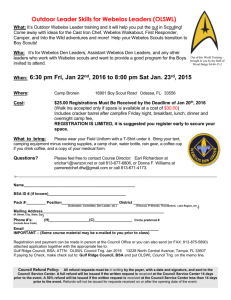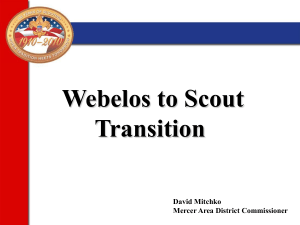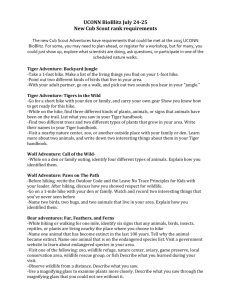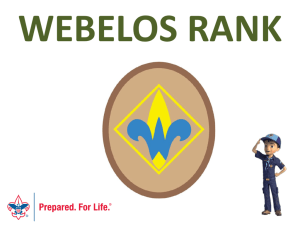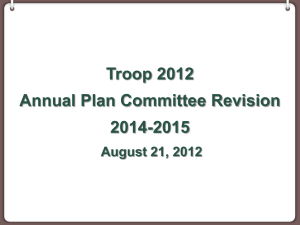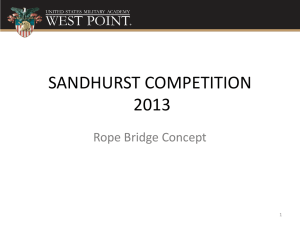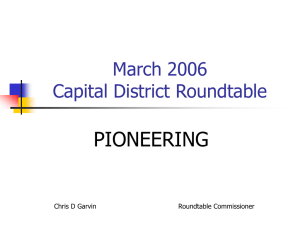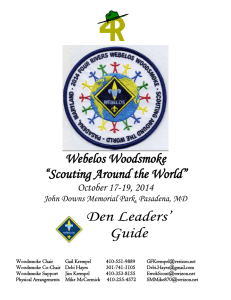Pioneering Merit Badge
advertisement
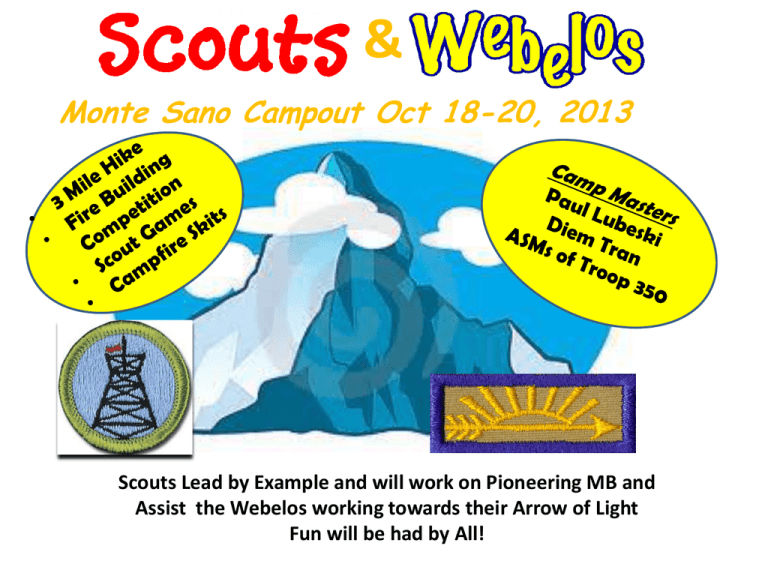
& Monte Sano Campout Oct 18-20, 2013 Scouts Lead by Example and will work on Pioneering MB and Assist the Webelos working towards their Arrow of Light Fun will be had by All! • • • Webelos are responsible for their own transportation, food (with exception of dinner and snacks for cracker barrel on Saturday which will be provided by Troop 350), tents and campsite fees (campsite fee is $2.00/camper). Webelos must camp with a Parent or Guardian Webelos Leaders please let Mr. Lubeski (256-682-7038 paul.lubeski@adtran.com) or Mr. Tran (256-430-3360 diemtran@yahoo.com ) know how many campers are in your party Cost for Scouts from Troop 350: $15 dollars per camper. Of the $15 dollars, $12 dollars per scout is budgeted for Food to cover 4 meals plus 1 Cobbler to share with the Webelos. Gas: The Troop will reimburse the driver that hauls the Trailer to the top of Monte Sano. Because Monte Sano is so close, we’re currently not planning on reimbursing our other drivers. Oct 18th at 5 pm, we’ll meet at the Gear Garage to check out Patrol Gear Oct 20th, before lunch and hopefully between Masses, we’ll return to the church parking lot Medications: Parents please clearly label and supply the Camp Masters with the medications and instructions that your scout may need. Arrow of Light: With your Webelos den, --- visit one Boy Scout-oriented outdoor activity. --- Participate in a Webelos overnight campout or day hike. Outdoorsman: • Present yourself to your Webelos den leader, properly dressed, as you would be for an overnight campout. • With your parent or guardian, camp overnight with a Boy Scout troop. Sleep in a tent that you have helped pitch. • Discuss with your Webelos den leader the rules of outdoor fire safety. Using these rules, show how to build a safe fire and put it out. • With your accompanying adult on a campout or outdoor activity, assist in preparing, cooking, and cleanup for one of your den's meals. Discuss with your Webelos den leader the things that you need to take on a hike. Go on one 3-mile hike with your Webelos den or a Boy Scout troop. • Pioneering Merit Badge: 1. Show that you know first aid for injuries or illness that could occur while working on pioneering projects, including minor cuts and abrasions, bruises, rope burns, blisters, splinters, sprains, heat and cold reactions, dehydration, and insect bites or stings. 2. Do the following: Successfully complete Tenderfoot requirements 4a and 4b and First Class requirements 7a, 7b, and 7c. (These are the rope-related requirements.) Tie the following: square knot, bowline, sheepshank, sheet bend, and roundturn with two half hitches. Demonstrate the following: tripod and round lashings. 3. Explain why it is useful to be able to throw a rope, then demonstrate how to coil and throw a 40-foot length of 1/4- or 3/8-inch rope. Explain how to improve your throwing distance by adding weight to the end of your rope. Pioneering Merit Badge: Pioneering Merit Badge: 4. Explain the differences between synthetic ropes and natural-fiber ropes. Discuss which types of rope are suitable for pioneering work and why. Include the following in your discussion: breaking strength, safe working loads, and the care and storage of rope. 8. Demonstrate the use of rope tackle to lift a weight of 25 pounds and pulling a log at least 6 inches in diameter and 6 feet long with the tackle. Use the tackle to put tension on a line. Explain the advantages and limitations of using a rope tackle. In your explanation, describe the potential damage that friction can do to a rope 5. Explain the uses for the back splice, eye splice, and short splice. Using 1/4- or 3/8-inch three-stranded rope, demonstrate how to form each splice. 6. Using a rope-making device or machine, make a rope at least 6 feet long consisting of three strands, each having three yarns. 7. Build a scale model of a signal tower or a monkey bridge. Correctly anchor the model using either the 11-1 anchoring system or the log and stake anchoring method. Describe the design of your project and explain how the anchoring system works. . 9. By yourself, build an A-trestle OR X-trestle OR Htrestle using square and diagonal lashings. Explain the application of the trestle you build. Demonstrate how to tie two spars together using a shear lashing. 10. With a group of Scouts, OR on your own, select a pioneering project. With your counselor's guidance, create a rough sketch of the project. Make a list of the ropes and spars needed, then build the project. (Note: This requirement may be done at summer camp, at district or council events, or on a troop camp outing.)
